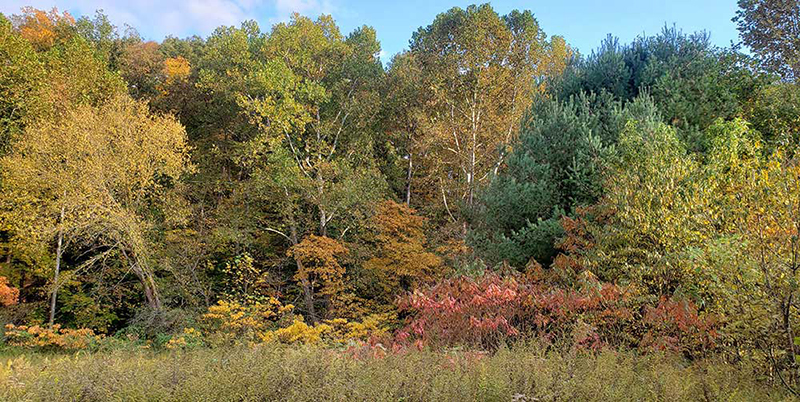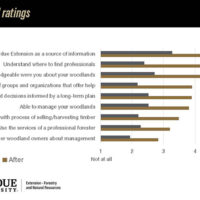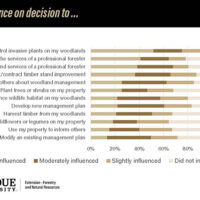 Purdue University - Extension - Forestry and Natural Resources
Purdue University - Extension - Forestry and Natural Resources
Forest Management for the Private Woodland Owner Course
Issue:
Forests cover nearly 20% of Indiana, and approximately 85% is in private ownerships like farms and families. Less than 20% of those owners have a forest management plan to guide them in the sustainable management of their property. Forests provide multiple ecologic, economic, and societal benefits, but may not be realizing their potential due to poor or no management activity, and threats like invasive plant species and pests. Indiana forests also support an important forest products industry, employing thousands of people and supporting many rural communities. Private forestland owners are often unaware of the resources and assistance available to them for realizing their property management goals. The Forest Management for the Private Woodland Owner course provides forest landowners eight learning sessions designed to introduce them to the biology and management of forests, and the resources and professional assistance they can access to help them form their property management goals and pursue their objectives. Field experiences are integrated into the course to provide in-person, hands-on connections with the biology and management of Indiana forests. Connections made during the course and field tours introduce landowners to the foresters and other natural resource professionals who can help them with the management of their forestland.
What Has Been Done:
Purdue Forestry and Natural Resources Extension has provided the Forest Management for the Private Woodland Owner course. Participants attend eight evening sessions of the Forest Management for the Private Woodland Owner course lead by Don Carlson, Lenny Farlee, Jonathan Ferris, Dave Osborne, and Ron Rathfon in various locations around the state. Carlson, Ferris, Osborne and Rathfon host sessions in southern and east-central Indiana while Farlee hosts sessions in central and northern Indiana. In 2021, Farlee offered the course online due to the limitations presented by the pandemic and plans to do so in 2022 as well. The topics for the series included tree identification, Indiana forest history and ecology, forest management planning, forest management practices, considerations for selling timber, forest economics and taxation, wildlife habitat management and resource and assistance for woodland owners. One or two field tours are included for hands-on learning experiences.
Results:
Based on survey results of the most recent program, 94.4% stated that the information was useful to help them make future decisions and 92.5% stated that the information was useful to help act to manage their property objectives. There was an 82% increase in knowledge of woodland management practices and considerations for selling timber with an 85% increase in knowledge of forest economics and taxation. There was a 102% increase in knowledge of resources and assistance for woodland owners. 81% of participants were extremely likely to recommend Purdue Forestry and Natural Resources to others to contact for information on woodland management. Participant comments: “As an absentee landowner, I loved the online delivery format.” “The content was especially relevant to people with a wide range of backgrounds in woodland management…from beginners to experienced landowners.”
This course is offered annually at various locations around the state, generally between January and April. Extension Educators wishing to be a site host for the course in their area, and woodland owners wishing to attend the course, should contact the Purdue Extension staff listed on this page, or visit the Purdue Forestry and Natural Resources Extension website: purdue.edu/fnr/extension.



